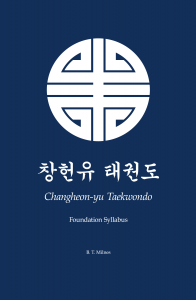천지
Revised Romanisation: Cheonji
McCune-Reischauer Romanisation: Ch’ŏnji
Sometimes written: Chonji, Chon-ji, Chon Ji, Chunji, Chun-ji, Chun Ji
Floor Diagram for Chonji

Movements of Chonji
Chonji has 19 movements.
Form a parallel ready stance towards A.
- Turn to the left and step towards D with the left foot, forming a left walking stance towards D. Block to the low section with the left outer-forearm.
- Step towards D with the right foot, forming a right walking stance towards D. Punch to the mid section with the right fore-fist.
- Turn to the right and step towards B with the right foot, forming a right walking stance towards B. Block to the low section with the right outer-forearm.
- Step towards B with the left foot, forming a left walking stance towards B. Punch to the mid section with the left fore-fist.
- Turn to the left and step towards A with the left foot, forming a left walking stance towards A. Block to the low section with the left outer-forearm.
- Step towards A with the right foot, forming a right walking stance towards A. Punch to the mid section with the right fore-fist.
- Turn to the right and step towards C with the right foot, forming a right walking stance towards C. Block to the low section with the right outer-forearm.
- Step towards C with the left foot, forming a left walking stance towards C. Punch to the mid section with the left fore-fist.
- Turn to the left and step towards B with the left foot, forming a right ‘l’ stance towards B. Block to the mid section with the left inner-forearm.
- Step towards B with the right foot, forming a right walking stance towards B. Punch to the mid section with the right fore-fist.
- Turn to the right and step towards D with the right foot, forming a left ‘l’ stance towards D. Block to the mid section with the right inner-forearm.
- Step towards D with the left foot, forming a left walking stance towards D. Punch to the mid section with the left fore-fist.
- Turn to the left and step towards C with the left foot, forming a right ‘l’ stance towards C. Block to the mid section with the left inner-forearm.
- Step towards C with the right foot, forming a right walking stance towards C. Punch to the mid section with the right fore-fist.
- Turn to the right and step towards A with the right foot, forming a left ‘l’ stance towards A. Block to the mid section with the right inner-forearm.
- Step towards A with the left foot, forming a left walking stance towards A. Punch to the mid section with the left fore-fist.
- Step towards A with the right foot, forming a right walking stance towards A. Punch to the mid section with the right fore-fist.
- Step backwards towards C with the right foot, forming a left walking stance towards A. Punch to the mid section with the left fore-fist.
- Step backwards towards C with the left foot, forming a right walking stance towards A. Punch to the mid section with the right fore-fist.
Bring the left foot to the right foot, and form a parallel ready stance towards A.
Learning Chonji
- For the first 16 movements, the movements are always a block followed by a step forwards and a single punch.
- For the first 16 movements, whenever you turn, if you’re turning left, you turn 90 degrees, and if you turn right, you turn 180 degrees.
- You travel along each line of the floor diagram twice.
Korean terminology relevant to Chonji
Here is the Korean for some of the English terms used to describe the movements of the form above:
| English | Korean |
| stance | 서기 sogi |
| walking stance | 걷는 서기 gonnun sogi |
| ‘l’ stance | 니은자 서기 niunja sogi |
| left | 왼 wen |
| right | 오른 orun |
| forearm | 팔목 palmok |
| inner-forearm | 안팔목 anpalmok |
| outer-forearm | 바깥팔목 bakkatpalmok |
| block | 막기 makki |
| fore-fist | 앞주먹 apjoomok |
| punch | 지르기 jirugi |
More information

You can find more information on this topic in the book Changheon-yu Taekwondo: Foundation Syllabus, which is a handbook for colour belt students who are training in Changheon-yu Taekwondo (ITF Taekwondo). It contains movement descriptions, floor diagrams, and relevant Korean terminology for all of the colour belt patterns.